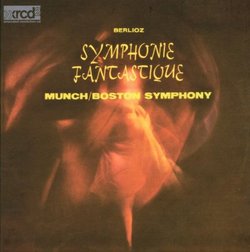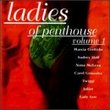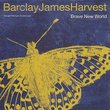| All Artists: Hector Berlioz, Charles Münch, Boston Symphony Orchestra Title: Berlioz: Symphonie Fantastique Members Wishing: 0 Total Copies: 0 Label: Jmc / Xrcd Original Release Date: 1/1/2008 Re-Release Date: 9/25/2001 Genre: Classical Style: Symphonies Number of Discs: 1 SwapaCD Credits: 1 UPCs: 693692100129, 4975769219047 |
Search - Hector Berlioz, Charles Münch, Boston Symphony Orchestra :: Berlioz: Symphonie Fantastique
 | Hector Berlioz, Charles Münch, Boston Symphony Orchestra Berlioz: Symphonie Fantastique Genre: Classical
Charles Munch's overwhelming natural affinity with French music made him an ideal conductor for Berlioz's swirling tour de force Symphonie Fantastique. The Lewis Layton/Richard Mohr recording from 1962 perfectly captures t... more » |
Larger Image |
CD DetailsSynopsis
Product Description Charles Munch's overwhelming natural affinity with French music made him an ideal conductor for Berlioz's swirling tour de force Symphonie Fantastique. The Lewis Layton/Richard Mohr recording from 1962 perfectly captures the drama and romance of this piece. Track Listing 1. Reveries: Passions 2. A Ball 3. Scenes in the Country 4. March to the Scaffold 5. Dream of a Witches' Sabbath Similar CDs
|
CD ReviewsImpressive! Enaitz Jar | Spain, Europe. | 09/13/2005 (5 out of 5 stars) "Charles Munch, the great Romanticism master, recorded two different versions of this work with the Boston Symphonic Orchestra, one in 1954 and this gem in 1962. The first one is good enough, the second one is truly amazing. Recorded with prehistoric experimental stereo, at the time it was recorded (by the legendary sound engineering pioneer Lewis Layton) it was a cutting edge recording, showing the best of RCA tech in the "Living Stereo" series. Now, it needed a good remaster not to lose it's position as the best Symphonie Fantastique ever recorded. It's unbelievable the sound quality achieved by this XRCD (Expanded Resolution CD) new remaster technique, and it's playable on any CD player. The people at JVC has done a superb work, it can be compared with any ADD recording, and it's even better than some DDD ones. As a 1962 quasi experimental classical recording you should not expect much of the sound quality, and this was true until this release. While the previous remasters were satisfactory, this is simply unbelievable, the sound is equivalent to what you should expect from a real good classical recording from the eighties. I think this remaster work worths the high prize asked, but if you are on a real tight budget you could try the cheaper "Living Stereo" edition of the same recording. The performance, as any conducted by the great Charles Munch, is impressive. Charles Munch was a Romanticism specialist, his recordings of Berlioz, Ravel or Saint-Saens are a musical legend. In this recording the musical forces used are enough to conquer a world. In the "March To The Scaffold" the driving tympani sounds like an earthquake, most because of the reverberation. Usually, I dislike old recordings because of the blurring echoes and reverberations, but here it helps creating a thrilling atmosphere, and, curiously, the echoes only seems to affect the Scaffold's tympani, keeping a very clear, echoes free, sound for the rest of the Symphonie. Munch could be an angel or a devil. The waltz at the second movement, with it's angelical crystal clear harp opening, is delicious. The witchy and chaotic final, with the death tolling bells, is scary. The bells sounds so deep and clear that you'll think they are sounding from the street and not from the record player. The tempo played is the perfect one, sometimes slow, meditative and dramatic, and sometimes lightning quick. The fast movements are astounding. The fourth and fifth movements (the "opium trip" movements) are quick and thrilling, you can feel the terror of the artist on the last movement on a way never heard before. On the Scaffold, the brass military march conducted by the leading force of the atomic tympani (visually is a cross between the Indiana Jones main theme and the Pink Floyd's Wall hammers march) moves you inevitably to follow the rhythm with enthusiasm. About other recordings, I first got interested in Gardiner's version. Gardiner's recording was performed on really hard to find period instrumets (like the "serpent" or the "ophicleides") at the same concert hall were the premiere was conducted in 1830 by Hector Berlioz himself. At a first glance, this recording is good sounding and full of "glamour" so it was an obvious choice. But when I compared it with Munch's I discovered that it was like if the volume in Gardiner's recording was cutted off, it has a total miss of punch, is soft and weak to the extreme, specially at the second track, and this makes the full recording sound dull and plain. Apart of the historical interest, the only remarcable in this recording is the tempo which (as always with Gardiner) is almost perfect, and the "organic" textures achieved. For example, at the end of the Scaffold, when the orchestra gives the guillotine stroke, it seems like you can hear the bones crushing and the blood splash, and this isn't so colouristic with Munch. Muti's and Davis's versions are good ones, but they haven't quite a half of Munch's spectacularity and power. Berlioz always liked extremely large orchestras, to create loud walls of sound you could fisically feel, and with Munch the power feels maximus. He could be delicate sometimes, but never weak. Summing up, this is a collosal recording, unbeated for more than 40 years, and now with a refreshing sound from the best (quasi Sci-Fi) remaster technologies available. Berlioz would be proud." The apex of the Romanticism ever expressed! Hiram Gomez Pardo | Valencia, Venezuela | 12/22/2005 (5 out of 5 stars) "There is not any single doubt to affirm this well know Symphony is a prototype by itself of the maximum Romantic expression ever composed. The febrile imagination and the dreamy landscapes seem to confirm it and even witness it.
The incandescent reading offered by Charles Munch with the most aristocratic American ensemble ever existed The Boston Symphony deserves a special place in your collection. Elegance, phrasing, sonority, passion and mercurial energy are conjugated in the accurate proportions. Maybe you are engaged by any other version. But still on, take your time and simply listen the thundering First Movement or the sensual refinement of the Waltz in the Second Movement. Once you finished listening I may guarantee you, you will change your mind and will acquire it without hesitating. Nevertheless, the 1954 version is even superior to this one." |

 Track Listings (5) - Disc #1
Track Listings (5) - Disc #1



